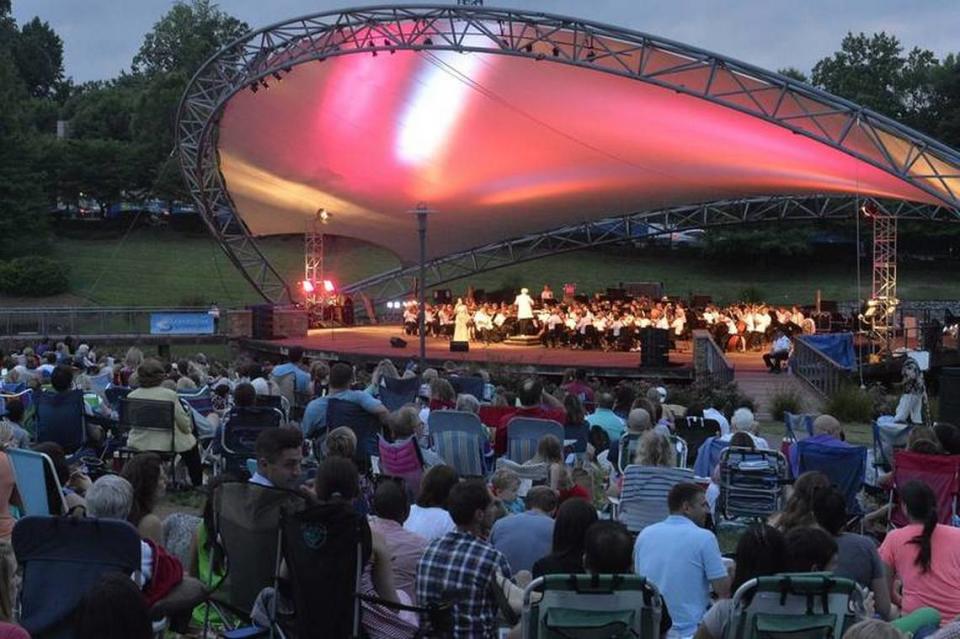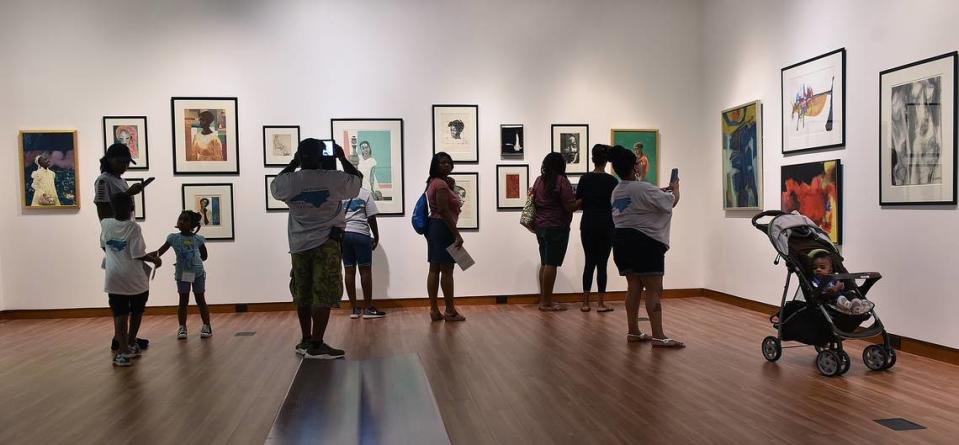2 Charlotte nonprofits offer new plan for arts funding. They’ll need public money first
The Arts and Science Council and Foundation for the Carolinas could shake up funding for Charlotte’s arts community through a reorganization, and they want a sizable commitment from the city and Mecklenburg County to make it happen.
The two groups “are exploring ways to join forces to help secure more funding for the arts and cultural community” and to make the community “one of the arts capitals of the world,” ASC board chairman Tony Perez told Mecklenburg County commissioners in a presentation Tuesday. The ASC is the longtime funding pass-through agency for area arts and culture groups, and the nonprofit foundation has more than $4 billion in assets.
While some key administrative details remain unclear, the Foundation for the Carolinas would get a say in who sits on the the arts council’s board, which provides oversight of the group’s president and funding decisions.
The proposal comes as both the city and county are entering budget season, with both setting revenue and spending levels before July 1.
Perez described the plan as a “lift and shift” for his organization. It’s been a tumultuous stretch for the ASC as it dealt with the city taking much of its funding for a new approach and, more recently, the departure of Krista Terrell as president.
“We lift the ASC, shift it under the Foundation for the Carolinas. And we keep doing, they keep doing the great work, plus more,” he said. The groups have signed a memorandum of understanding, though there are “lots of details left to be worked out,” Perez told commissioners.

The plan calls for a combined investment of $21 million annually from Charlotte and Mecklenburg County to help address financial woes that have plagued the local arts community since the COVID-19 pandemic and a fracture between the county and city on arts spending.
County commission chairman George Dunlap said, while the new proposal is “not fully baked,” it addresses many of the concerns over equity and inclusion that led to that split and will help secure the future of the arts for years to come.
“When the county and the city decided to do something different, I would say that the arts community in Mecklenburg County suffered as a result,” he said. “And so the people who are intricately involved in the arts community helped structure this as a way to bring both bodies together, along with the Foundation for the Carolinas.”
But some commissioners questioned whether the new plan contains a big-enough commitment to diversity and whether they’d have enough oversight over the new system. The city of Charlotte, meanwhile, says it hasn’t agreed to the just-proposed plan as it weighs how to best approach arts funding within its own new culture plan.
How much will Charlotte, Mecklenburg County spend on arts funding?
Under the restructuring proposal, Charlotte and Mecklenburg County would be the primary funding sources for the revamped ASC. It calls for $11 million in funding per year from the city and $10 million from the county. And the groups want a five-to-10-year commitment, Perez told commissioners.
“That $21 million as far as we can tell is the most ever for this county in terms of funding for the arts,” Perez said.
Uncertainty around funding has plagued the local arts community since 2019, when voters rejected a referendum for a quarter-cent sales tax increase that would have pumped $22.5 million into the local arts sector.
Then, the COVID pandemic hit arts organizations hard by shuttering venues. In early 2021, the Charlotte City Council diverted much of its longstanding funding for the ASC to a newly formed Arts and Culture Advisory Board.
The city established “the Infusion Fund,” a public-private partnership in conjunction with the Foundation for the Carolinas to distribute arts money. The fund has generated more than $41 million, “with a focus on stabilizing the local arts and culture ecosystem while a comprehensive cultural plan was developed,” the city said in a statement. The city has also provided “approximately $14 million per year to support the debt on several city-owned cultural institutions.”
Mecklenburg County stuck with the ASC — something Dunlap, without citing specifics, said Monday was rooted partially in concerns the city’s plans didn’t do enough to ensure support for a diverse slate of artists and organizations in funding decisions.
But the Infusion Fund is slated to end June 30. And the Charlotte Arts and Culture Plan approved by the City Council in November offered no details on how much money would be needed moving forward, where that money should come from or who would spearhead private fundraising efforts.
County manager Dena Diorio told commissioners Monday the proposed $21 million would fill the gap left when the 2019 referendum failed and address uncertainty created by the end of the Infusion Fund.
“That was the amount we were going to capture and use to fund the arts,” she said.
But, she stressed, neither the city not the county have agreed to the proposed funding levels yet.
“There have been no financial commitments made,” she said.
Existing ASC endowments would still be designated for their original purposes, the group said in its Tuesday presentation to commissioners. And the ASC expects to continue fundraising from individual donors and private groups.
Proposed changes to arts grants
ASC representatives say it would continue to give grants to:
Individual artists
Non-annually funded groups
Grassroot organizations
Neighborhood groups
Community events
Other grant programs facilitated by ASC
A grant-giving board would be appointed by a new ASC governing board made up of 17 directors: seven appointed by the county, five by the city, two by a new ASC Nominating and Governance Committee and three by the Foundation for the Carolinas.
The foundation will also ratify all board appointees and select the board’s chair from the 17 directors.
“Both the county and the city will have their fair share of representation,” Perez said of the proposed boards. “... We really like this structure. It gives us broad representation.”
Questions about oversight over new structure, inclusion efforts

Multiple commissioners questioned whether the proposed structure will give them enough oversight over such a large public investment.
“Why should I delegate my approval authority to appoint governing board members to the Foundation for the Carolinas?” Commissioner Arthur Griffin asked.
Dunlap said the appointment process for the county’s seats on the ASC board would be the same as the existing process for appointing people to the commission’s citizen advisory boards, where any resident can apply and commissioners vote in open meetings on their picks.
“I think it’s an opportunity to get more people who are concerned about the arts involved ... and therefore have a much better process than before,” he said.
Griffin said he also has concerns about whether the proposed plan will do enough to ensure equity and inclusion in funding decisions and address structural inequalities, referencing comments made by City Council member Ed Driggs during an October council meeting about the importance of supporting the city’s major arts organizations.
“One of the motivations for us to (increase city funding) was the fact that some of our legacy organizations were starving for funds and their existence was threatened,” Driggs said in that meeting. “In my mind, that was pretty key. I believe that those organizations and their tradition of acknowledging ‘historical European culture,’ I‘ll call it, is one of the things that marks Charlotte as a world-class city.”
Driggs later told the Observer he wanted city leaders to be clear about prioritizing public funding for the “future viability” of arts programs within large, city-funded venues.
Griffin said Tuesday he’d want to see a better commitment to artists and organizations from historically marginalized communities.
“I would certainly be really cautious moving forward,” Griffin said.
What does the city think?
Asked by commissioners how the ASC’s plan fits within the city’s plan, Perez said “it absolutely aligns with their vision,” though the city said in a statement provided to The Charlotte Observer that Tuesday’s proposal “does not reflect an approved allocation by the Charlotte City Council.” City staff have been working on a funding approach in accordance with the Charlotte Arts and Culture Plan and with a focus on “public sector collaboration,” spokesman Lawrence Corley said.
“The city will continue to discuss ongoing, reliable funding for activities in the Charlotte Arts and Culture Plan,” he said.
But the city’s statement said that while Charlotte “has been a major supporter of the arts and culture community and is supportive of any effort to create a more sustainable arts and culture system,” the city “was not part of the discussions between the ASC and the FFTC related to any combination or partnership of those two organizations, and we are not in position to comment on this specific proposal.”
“The city anticipates that it will continue to focus city funds on directly supporting artists and arts organizations,” Corley said.
In our CLT Politics newsletter, we offer exclusive insight into Charlotte-region politics sent to your inbox on Thursdays. Subscribe for free. Story idea? mramsey@charlotteobserver.com.

